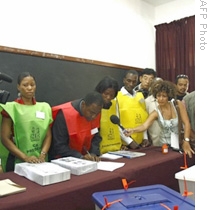Maputo
29 October 2009
 |
| A municipal employee, flanked by other workers, signs a documents during the fourth Mozambican general elections in Maputo, 28 Oct 2009 |
The head of the National Electoral Commission's technical unit, Felisberto Naife, says most of the country's polling stations had finished counting their ballots and no major incidents had been reported on election day.
He says the process was normal, peaceful and orderly. Many people voted and therefore he is certain that turnout will be higher than it was five years ago when it reached only 36 percent.
He says the results are being sent to district centers and provisional results should be released beginning next week.
An official of the observer mission of the Southern African Development Community, Kasuka Mutukwa, said preliminary observations of the balloting were positive.
"It has been very peaceful," he said. "People stood in long queues, including young people. So we are waiting for the figures of what the turn-out is but certainly it was quite impressive what we saw preliminarily."
The head of the European Union observer team, Fiona Hall, said her group noted some technical difficulties, such as missing voting materials, but action was usually being taken to solve the problem.
"There was a good level of scrutiny of the process," said Hall. "Ninety-five percent of the polling stations that we observed had some party officials present and 80 percent of them had some domestic observers to scrutinize the process."
President Armando Guebuza is running for a second five-year term and his Frelimo party is expected to win a majority of the 250 seats in parliament.
Veteran opposition leader Afonso Dhlakama is running for the fourth time. His Renamo party is being challenged for the leadership of the opposition by a new party.
The Mozambique Democratic Movement was founded by the mayor of Beira, Daviz Simango, after he was expelled from Renamo last year.
These are the fourth national elections since Frelimo and Renamo ended a bitter civil war in 1992. One million people died in the 16-year conflict and millions more were displaced.
Professor Gil Lauriciano of Maputo's Institute for International Relations says Mozambican democracy still bears the scars of the war.
"It is fragile, fragile in a way," he said. "It is a first experience. It is going to take a little while. Our rhetoric is still more like, military."
He says the political system is still evolving. And it will take time for the polarization to ease and for people to understand that they can disagree in a civil manner.